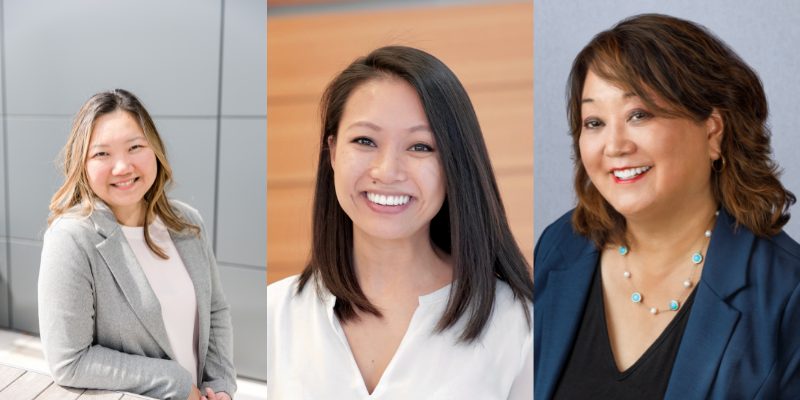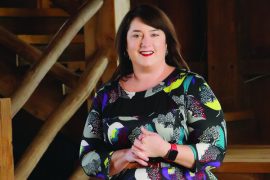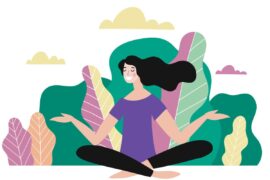By Katy Macek | Photos (from left to right): courtesy Angela Jenkins, Nhi Le, Larry Chua Photography
From sustainability to deep tech venture capital and creating “human-centric” teams, three Madison-based women have made major accomplishments in their chosen career paths — and offer unique perspectives on what it means to be Asian American in Madison.
BUILDING A DREAM CAREER
After 2 1⁄2 years working as a diversity and inclusion advisor for American Family Insurance, Angela Jenkins was promoted last May to chief of staff to the associate vice president of data science and analytics lab. In her new role, she leads and executes strategies to bring in top tech talent into the lab within the insurance company.
“Not only do I get to help drive what the strategy is, but I get to see the results,” she says. “I’m able to see the strategies come to fruition, and that’s been the biggest difference compared to my former role as an advisor.”
Jenkins’ story began in Kuala Lumpur, where she was born. Her parents emigrated to Seattle when she was 12 years old.
After a long, successful career in the field of biomedical engineering and pharmacology research, she changed course and became a diversity, equity and inclusion (DEI) practitioner.
“It [was] really the lack of role models and mentors,” that drove her to change industries, she says. “As a woman of color (Jenkins is Malaysian Chinese), I’m often the one, or maybe like one of two in the space.”
Now, she thinks her job with American Family is a unique hybrid of her experience.
“It’s a blend of my love of social justice, research, science, engineering and technology,” she says. “I really found my purpose in this work, and that’s what drives me.”
It’s also why she attends career fairs and establishes partnerships with nonprofits and higher education institutions. She is also part of the AAPI Coalition of Wisconsin, teaching and advocating for AAPI history to be taught and integrated into K-12 curriculum — something that is typically excluded from American history lessons and courses, she says.
While her work in the DEI space focuses on racialized people, she says that often, Asians and Asian Americans are not included in those conversations.
“It’s difficult and challenging and maddening to have a seat at the table and yet it’s never acknowledged. I’m right here and yet I’m not seen,” she says. “The ‘model minority’ myth has really caused deep damage from representation to the specific needs of AAPI communities and populations.”
USING SCIENCE TO POWER BUSINESS MODELS
Nhi Le (pronounced ñee leh) is a principal at Alpha Intelligence Capital and runs a consultancy called Mariton Partners that specializes in deep tech venture capital. Le explains that deep tech startups bring to market products that are developed through years of extensive scientific research or engineering. She points to Moderna, maker of one of the first COVID-19 vaccines as an example of a deep tech startup. The company was founded by a second-generation immigrant who wanted to employ stem cell research developed in his lab at Harvard University to create new medicines.
Le also serves as a mentor for the Wisconsin Alumni Research Foundation’s Accelerator program, which helps inventors figure out how to take their research from the lab bench to the marketplace. In addition, she advises Doyenne Group’s Evergreen Fund, a program that gives grants and equity financing to Wisconsin-based businesses that are women- and minority-owned.
Her consulting work focuses on helping academic research-based startups develop business plans, find financing, and scale and grow. She brings a business mindset to the scientific world.
“Entrepreneurship is hard — and it’s doubly hard when it’s a science- based company, because usually companies in this space are started by scientists. But, scientists know very little about the business side … so translating the science into a business application that people can use and understand is hard. I help act as a translator … I help [the scientist] figure out what form of their research can be commercialized.”
Le graduated from Georgia Tech with a double major in biomedical engineering and material science engineering, and received a PhD in material science specializing in stem cell research UW–Madison.
Le says being an immigrant, Vietnamese American woman in a STEM field can be isolating. She’s had her share of moments where she’s been uncomfortable or a colleague has failed to consider her culture. But, she’s mostly optimistic about the opportunities she’s been given and the support she’s received.
“… Many people have gone out of their way to actively open doors for me [and] get me into rooms typically inaccessible to immigrants and minorities, and [have] spoken well of me in those spaces to manifest opportunities I didn’t even know to ask for. I don’t know if people would think of me and my brand the same if I wasn’t who I am, in my entirety.”
PROMOTING SOCIAL JUSTICE THROUGH SUSTAINABILITY
Caroline Tu Farley is program director for the Linda and Gene Farley Center for Peace, Justice and Sustainability in Verona. The nonprofit sits on an idyllic 108-acre property of farm and woodland.
Tu Farley, whose mom was Japanese American and dad is Taiwanese, says her passion for peace, social justice and ecological sustainability is what brought her to the center. The nonprofit is named after Tu Farley’s mother- and father-in-law, and is what brought her to Madison in 2015 from Colorado, where she was living.
Her program work supports the center’s many initiatives. One is removing barriers to farming by offering underrepresented groups land, resources and technical support for small farm businesses. She also manages the Natural Path Sanctuary, a certified green burial site, or “green cemetery.”
The center offers tools and training for beekeeping, festivals, concerts, workshops on natural burials, food pantry gardens, land art exhibits and volunteer days. It also serves as an event space for other nonprofits, such as Urban Triage’s Supporting Black Healthy Agriculture program.
She is also on the advisory board for the Madison-based nonprofit We Are Many-United Against Hate, a group that “seeks equal protection for all, united against hate, bigotry and racism,” according to its website.
“There are groups [and] people that really do believe in making things better for everybody,” Tu Farley says. “I like to be around those types of people and organizations.”
She acknowledges that she has faced challenges based on cultural assumptions people have made about her. She says she has found ways to accept, overcome, educate and stand up to misconceptions, bigotry and racism.
“There are certain stereotypes or biases people have of you before they even meet you or just by looking at you,” she says. “But I like to surprise them.”




